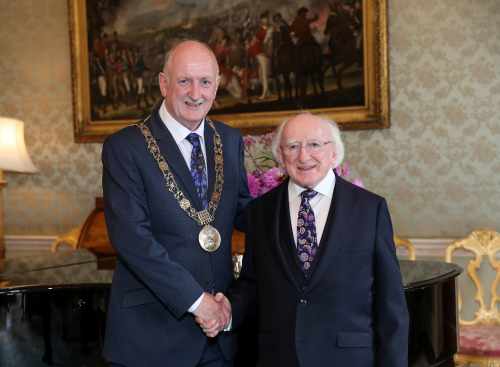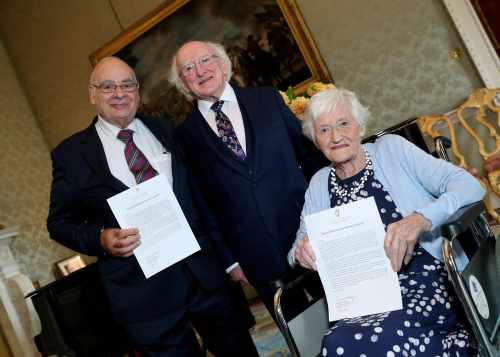Speech by Sabina Higgins for the Smashing Times ‘Women in an Equal Europe’ book and documentary Launch
Mansion House, Dublin, Wednesday, 15 August 2018
Good evening, it is an honour to be here with you all this evening for this very special occasion. Tonight, it is my privilege to launch the new Women in an Equal Europe book and documentary created by Smashing Times in partnership with organisations in Europe from Spain, Croatia and Serbia.
As a patron, I am also delighted to announce that Smashing Times are in the process of setting up a new Smashing Times International Centre for the Arts and Human Rights. As part of this process, the company are tonight launching a new website supported by Department of Culture, Heritage and the Gaeltacht. This new website is a digital resource for the arts and human rights, providing services for artists, activists and citizens in Ireland, Northern Ireland and around the world. It is a networking forum providing information, training and a platform for discussion on using the arts to promote and protect gender equality and human rights. The new website will host the Women in an Equal Europe book making this valuable and significant publication available to all.
The women in an Equal Europe book contains twenty-one interviews with women from Ireland, Spain, Serbia and Croatia. The aim of the interviews is to promote a remembrance of women’s equality, and experiences of life in Europe to ensure that women’s voices and stories are equally hard on acknowledged. The interviews are a fascinating insight into women’s experiences capturing the uniqueness and strength of each woman as they speak about their lives and the importance of gender equality for all.
The book is just a great read. Each woman is so strong and has such a wonderful and unique story to tell of their life and their progress through different pathways and opportunities to become conscious and confident in themselves, and above all in winning renowned as activists for feminism and human rights.
Each of their accounts throw light on the history of their country and the great changes that have taken place. In Ireland of moving from a deeply partriarchal country, where despite the best efforts of enlightened feminism, women and men, Ireland remained a country marked by repression where it was acceptable that women were discriminated against and made to occupy an inferior position in society.
Women relate their journey to becoming feminists and human rights activists and how their work, whether through art, education, the law and political involvement, can bring to society an awareness and understanding of feminism - which as many of them assert in their interviews requires the acceptance of gender equality in all aspects of life: sexually, physically, intellectually and spiritually.
A broad range of women from various backgrounds and countries across Europe are interviewed about their opinions on issues from feminism, to what makes them happy, and what advice they would like to give their younger selves.
The women interviewed in this book have all reached great heights of achievement in their fields and represent powerful agents for change. Ivana Bacik is a senior lecturer in Criminal Law in TCD and a Labour Party senator and has been to the forefront and done extraordinary work to promote women’s rights in Ireland. Mary Lawlor is a Human Rights Activist, former Director and Chair of Amnesty International Ireland and the founding director of Front Line Defenders. Front Line Defenders is now an internationally recognised foundation that protects human rights defenders around the world, supporting people who have the bravery to stand up for the rights of others in a non-violent way, despite the great danger and personal risks that they face. We salute the bravery of all human rights defenders and the work of women such as Mary Lawlor as they build civil and justice just societies.
Sinead Burke is a writer, academic and a significant figure in the world of fashion. Sinead regularly speaks out for more diversity in fashion and for the fashion industry to take on board the needs of people with disabilities. Sinead is a powerful advocate for the rights of people with disabilities and for the promotion of intersectional feminism and social change.
Orla O’Connor is the Director of the National Women’s Council of Ireland, which is at the forefront of advocating for women’s rights and formulating policies.
Arts and human rights are interdependent. Arts can only thrive in an environment that supports human rights. In places where human rights are denied or curtailed there is often a correspondence suppression of artistic freedom.
The book features Olwen Fouére, actor, director an artist, who refers to “the Arts as one of the few spaces that can be truly revolutionary in a fundamental way.”
As well as Constant Short, who is renowned as an artist, academic and political activist on the left.
Mary Moynihan herself of Smashing Times in her fine interview provides insights into her hopes for a better world. She says: “Educate yourself in relation to gender equality and human rights, learn about how the world is governed and who has power, we need systematic change at structural levels in society to ensure governments and institutions commit to gender mainstreaming.”
Theatre and poetry, music and song, dance and literature have always been instrumental in inspiring, rousing and supporting people in citizen’s actions to protest at injustice and subjugation and to advocate in the struggle for change by many different means. I will just mention for example, the influence that Ibsen through his great plays on social issues made on the Society of his time. Indeed, he made an immense contribution not just by his illumination of the wrongs in his own society, but he inspired so many writers including our own Shaw and O’Casey to write great place on social issues. Ibsen’s seminal play, A Doll’s House, is the great Women’s Liberation play, as Norah breaks free and sets out to find herself. It’s production by Focus Theatre in 1970 played its part in the Second Wave of the Women’s Liberation Movement in Ireland. It ran for 20 weeks and had discussions and women’s equality after the performance and toured around the country. I had the privilege of being in Focus at the time and of course Mary Moynihan and Olwen Fouéré are both Focus people too. We all in Ireland owe so much to the great genius of Theatre, Deirdre O’Connell, of the Stanislavsky Theatre and Focus.
There is fantastic work being done in theatre, which has been an enlightening force at all times and in all places. Smashing Times are to be congratulated for their commitment to women’s and human rights in their great productions.
Jimmy (Gralton’s) Hall is playing at the Abbey at the moment and is a great experience and a great way of using Drama and the Arts Drama, Music, Song and Dance, to explore the social consequences of the misuse of power.
There are also extraordinary interviews with women who are activists in human rights and the arts across Europe including Serbia, Croatia and Spain.
I want to extend a special congratulations to Senator Lynn Ruane for her moving foreword and a particular thanks to Lauren Guy, Ruth Deasy and Kilian Cuerda Ros for their research articles contained in the book. These articles explore the role of the EU in promoting equality and women’s rights and encourage us to discuss the kind of Europe we want for the future - a social Europe, one that promotes human rights and equality for all. Human rights are important to ensure that all human beings are treated on an equal basis with dignity, fairness and respect. Women’s rights are human rights and are inherent to all women regardless of status.
Women’s stories and experiences are an integral part of a necessary future discourse where equality is the norm enabling all people to be free and equal in dignity and rights.
It is an honour to launch this book, documentary and website in 2018, the centenary year of the celebration of votes for women. In 1918, suffragettes in every corner of the words were fighting for their voices to be heard and slowly, little by little, the waves they made around the world, led to a sea of change. For the past few decades, we have numerous incredible historians, by both male and female, putting women back into history and their work deserves to be centre-stage as women’s stories from history are celebrated and incorporated into our consciousness. We are learning more and more about ordinary yet extraordinary women such as Maud Gonne, Countess Markievicz, Eva gore Booth, Helena Moloney, Margaret Skinnider and Dr. Kathleen Lynn. However, more needs to be done to ensure that young people hear stories of powerful women from history as well as stories of powerful women from today.
Hearing stories about power women from today allows all women a stronger presence in public discourse and empowers both young men and women to become more active in society. Recognising the dignity and accomplishments of women and reading about their struggles, dreams and achievements, plays a vital role in giving us the strength and inspiration to continue the struggle for equality and dignity. Reading the Women in an Equal Europe book affirms how important women have always been in European society and bolsters efforts to promote women as influential role models for the future.
It is with genuine pleasure that I launched this book, documentary on website. I wish you all a wonderful evening and thank you for coming together for this unique celebration of women’s stories and human rights.


